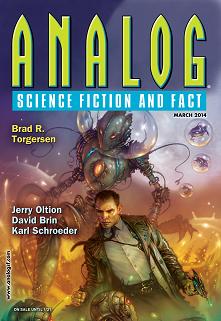 Analog, March, 2014
Analog, March, 2014
Reviewed by Louis West
“Life Flight,” by Brad R. Torgersen, is the 80 year audio journal of a boy’s life on an interstellar slow-ship. He was supposed to go into stasis after 10 years but discovers that his body can’t tolerate it. Instead of being able to wake at their destination as a young adult ready to meet the challenges of a new world, he’s trapped in a bitter-sweet existence, doomed to live out his entire life watching all those around him rotate in and out of stasis. While the story itself reads well, I confess to being disappointed. Early on, the young boy comments that the ship’s computers are smart enough to perhaps “learn to be people.” Unfortunately, that potential plot angle was never developed. I anticipated a more intriguing tale that interwove both the computer’s evolution into sentience with the boy’s struggles to master his rage at being denied a new life like everyone else. But then, that would have been a totally different story. Still, recommended.
In Megan Chaudhuri’s “Rubik’s Chromosomes,” Tecca’s been hired by surprise clients to review a master DNA plan for a human embryo. She’s a freelance geneticist and her clients—reclusive, old oil rich Sauds—want her to check the design for their child-to-be, a design engineered by one of the big genetic engineering firms that dominate the market. Using freeware and by manually studying coding sequences, Tecca discovers that the design would grow a brilliant and good-looking boy, but only a good-looking girl. She understands that different cultures have different standards but rages against the injustice in this design. Until she discovers a clever twist in the coding that reveals a weapon for social change.
A crisply told, tension-filled tale that dropped me deep into Tecca’s reality. In just a few pages, the author grapples with one of humankind’s greatest challenges—gender discrimination. I enjoyed both the story and the ideas it presents. And, as a nice personal touch to the tale, Tecca has a pet mouse she gene-engineered to be smart enough to solve Rubik’s cube puzzles. A definite read.
In “Not for Sissies,” by Jerry Oltion, people snuff themselves when their health starts to fail. Take Nathan’s husband, Greg, for example, who kills himself at age 45 because he can’t stand the idea of slowly dying from prostate cancer, even though it could take ten years or more. In an act of rebellion against accepted norms, Nathan decides to live, in spite of the growing ravages of old age, but eventually realizes that continued living is “not for sissies.” Sadly, I found this story rather pointless, since it’s mostly filled with Nathan’s sour grapes about life being hard. True, this is the way a diehard curmudgeon might live, but not an interesting read for me, since Nathan never discovers any value to his existence.
Stephen L. Burns’ “The Teacher’s Gamble” rewrites what we understand about the 1908 Tunguska blast to suit the needs of this story, since the most likely cause was a high-altitude airburst of an icy mass, not a rocky or metallic asteroid. However, putting aside that distraction, the story came across to me as a rambling narrative by an ancient alien frustrated at its inability to save wayward civilizations from destroying themselves. I never got any sense of what compelled this entity, or its remaining kind, to do this other than a single statement that they sought to “make amends.” For what? That to me is the greater story that’s missing from this, especially since the title says “teacher.” Teacher of what? Color me confused and disappointed.
“The Avalon Missions,” by David Brin, is a short space-age rewrite of the fable of the tortoise and the hare, with a slow Mariner 16 interstellar probe as the tortoise and its progressively faster successors as hares. Each “hare” either destroys, erases or arrests its predecessor upon catching up with it until, several millennia later, the first probe finally reaches its destination. There it contentedly ponders an unexpected discovery. An enjoyable read. Recommended.
Maggie Clark’s “We Who Are About to Watch You Die Salute You” is the most difficult to read of all her work that I’ve encountered. In contrast to “Aquatica” (which I loved), where the POV is a deep-ocean Anglerfish, this tale is information-dense requiring a slow, studious read in order to grasp the author’s intent. Earth’s colony on Mars is failing and investors are pulling out. The colonists are dying from radiation poisoning for reasons unknown, yet a ship carrying four women has taken off to help rescue and reinvigorate the colony (consisting of 14 men, of course). Guy Morgan, author, remotely interviews the rescue crew to understand why they embarked on this one-way trip. Their reasons? A passionate need to go, to try and make a difference, combined with a nihilistic fatalism about their chances of survival. I conjecture that the interview itself and the article that is to come from it are the “salute” referred to in the story title. If so, it’s a sadly unenthusiastic salute, but then that may be the very point of the story: Humans sometimes abandon the hopeless because it’s too painful to think of them otherwise.
My biggest complaint is that there are so many sidebars, whose relevance escapes me, such as Guy’s reading preferences, the advent of indentured servitude for vagabond youths on early 21st century cruise ships, or a discussion about gory porn vids about “space chicks.” That, plus the overwhelming plethora of detailed information about the complex world behind this story often left me bemused as to what the real plot was about. Very distracting. Not for me.